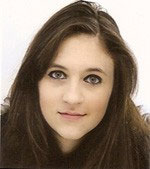Q&A with JDF recipient Claire French
Claire French is currently business editor at The News in Portsmouth, having previously worked at the Surrey Advertiser. She completed her journalism training at City College Brighton and Hove.
 Claire French is currently working as the business editor at The News in Portsmouth, having previously worked for the Surrey Advertiser. She completed her journalism training at City College Brighton and Hove. Find out more about Claire’s passion for journalism, her training, life as a journalist and how the Journalism Diversity Fund helped her career.
Claire French is currently working as the business editor at The News in Portsmouth, having previously worked for the Surrey Advertiser. She completed her journalism training at City College Brighton and Hove. Find out more about Claire’s passion for journalism, her training, life as a journalist and how the Journalism Diversity Fund helped her career.
Why did you want to become a journalist?
I’ve been asking questions since I first learnt to speak. I am inquisitive and nosey and want to find out the truth, not what people want you to hear. I enjoy reading long reports and finding out about the world. Most of all I like telling people things they don’t already know.
My mum had always spoken fondly about her uncle who was a journalist at the Manchester Evening News, among other titles. I would like my family to be proud of me in the same way.
What were you doing before your journalism training?
I graduated from Roehampton University in 2010 with a 2:1 in Sociology with Journalism and News and Media. After taking some time out to travel, I interned at a political website for a month and then a three-month internship at a think-tank in Westminster as a media officer. During this time, I applied for a place on an NCTJ-accredited course and for the Journalism Diversity Fund.
Did you have journalism related work experience before you applied to the Journalism Diversity Fund?
Yes. I blogged while at university and was asked to write for the website I later worked at. In May 2010 I started writing a monthly column for a political magazine called Tribune. In January 2011 I wrote a guest column in the People newspaper (my first paid piece of journalism; it felt great) and wrote for other publications including the New Statesman website.
How did you find your course?
The course was incredibly useful for the job I do now. Getting by without shorthand and media law in a newsroom would be near enough impossible. The five-month course I enrolled in was intense; it was something like a constant deadline day. I made some excellent friends during my time at journalism school and would encourage any potential journalist to do the course.
While on the course I spent a week at the Financial Times and a second at the People in their respective parliamentary offices. After completing the exams I did some work experience at the Guardian, freelanced at ITV Meridian and People offices.
What advice would you give to someone who wants to pursue a career in journalism?
Don’t be scared to work. Put everything into it and put yourself out there: I wrote between three and five blogs a day at one point. People will take notice if you stick at it. Use Twitter to interact with people to tell them what you are doing, and most importantly, to make connections. My success has been thanks to the journalists I have met and who have believed in me. Networking – as much as everyone says it is important – has been key to everything I have been able to do.
What diversity do you bring to the newsroom?
I try to choose stories that represent elements of the community whose voices are not always heard. I was awarded the bursary for arguing that my background – being brought up in an unemployed, single-parent household – was not a particularly well-represented demographic in the industry. As well as being made up of white men, the news media industry as a whole continues to be rather middle class. I have always believed in speaking out, and about, the people who have the least power in society.
What are you currently doing and what do you love most about your job?
The thing I like most about my job is having the support of my newsdesk to be able to investigate things and delve a bit deeper beneath the surface of a story to come up with a story that really means something.
How did you find completing the NQJ?
I passed the NQJ on first attempt a year ago, thankfully, and I’m glad I won’t have to sit any more exams. I sat the first exams in the new format and it was clearly more challenging than past papers in the old NCE style, so I was very relieved when I got my results.

